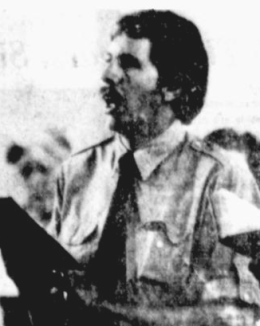The New York Times news service carried this report on , or thereabouts:
Minister Refuses to Pay Military Share of Taxes
by Douglas C. McGill
New Haven, Conn. — For the last two years, the Rev. Carl Lundborg, pastor of the First & Summerfield United Methodist Church here, has not paid half of the federal income tax he owed.
Instead, both years, he sent the Internal Revenue Service a letter that read in part, “My obligations as a Christian and a citizen are no longer reconcilable. The 50 percent of my taxes that support the military I cannot pay.”
A few months after he filed his tax return this year, an IRS agent visited his home and tried to collect the taxes due. “He was very pleasant,” Lundborg said. “But I said I didn’t plan to pay the taxes, and I didn’t offer any information.”
Several weeks later, the agent visited Lundborg’s church and ordered the church board to turn over Lundborg’s salary until the taxes he owed, together with interest and penalties, were paid in full.
, after the regular service, 40 church members voted unanimously not to honor the IRS order.
“He should have the right to act on his own conscience,” said Adeline Tucker, a church member, after the vote. “We have people in the congregation who do not agree with his position who still voted to support that right.”
Lundborg, who is 43 years old and known as Skip to his parishioners, has been pastor of the church for three and a half years. Before that, he worked for a total of three years at churches in Long Island, and spent nine years as a minister in Brooklyn.
His New Haven church has 270 members, including professionals, working class people and students. It is downtown, near the Yale University campus, across from the New Haven Green.
“What’s strange,” Lundborg said, “is that I’m very respectful of authority. I’ve never been arrested before, even for speeding. Now, every time I see a brown envelope from the IRS I really get scared. Sometimes I just leave it on the desk and open it the next day. What I’m doing is very scary.”
Still, Lundborg said, he is forcing himself to go through with the protest because he believes unabated tax support for a military buildup may end in a nuclear war that could destroy life on Earth.
“I’m not trying to be un-American,” he said. “But if it comes to that, I want to be more for the World. Of course, I want the Russians to stop the arms race, too. But this is where I live, this is where I can have some impact, so this is where I begin.”
After their meeting, church members gathered in an informal talk. Most of the people said they agreed with Lundborg’s feelings about nuclear war, but had voted more to support his right not to pay taxes than to support the political message behind his action.
“I don’t think our minister should be harassed because of his conscience,” said Harold Peterson, a church member. “If the clergy, whose job it is to preach the Gospel, can be harassed this way, there’s no hope for the laity.”
During the meeting, Peterson had urged the church to back Lundborg because “the church is being used as an instrument to come between Skip and his conscience. I think we should say ‘No,’ that we will not become that instrument.”
Some church members were ambivalent about the reasons for their vote. “I feel my taxes are determined by a legal process, with which I may or may not agree, and it’s my duty as a citizen to pay them,” said Dr. John Marsh. “But I definitely support Skip’s decision not to do so if he wants. That may sound hypocritical, but that’s the way I feel.”
Others said their vote was meant as a clear endorsement of Lundborg’s position on the arms race. “There are just too many people who aren’t eating,” said Adeline Tucker. “There ought to be an adequate defense, but what we have now is ridiculous.”
Edward Dobihal, chairman of the church’s administrative board, said the church would hire a lawyer to fight any enforcement action by the Internal Revenue Service against the church. He said the lawyer would argue that it would be unconstitutional to force the church to turn over its minister’s salary.
Albert Seeley, the IRS collections officer in New Haven assigned to Lundborg’s case, refused to discuss the case. But he did say that, in general, the agency could bring a civil suit against a third party for failing to honor a claim. A 50 percent fine could be levied against the third party, calculated on the amount of money it was withholding.
According to Larry Batdorf, a spokesman for the IRS in Washington, the agency could also place a claim against a person’s property to collect taxes due. Criminal charges may also be brought against tax resisters, although this is done relatively infrequently, he said.
According to both the IRS and peace groups around the United States, the amount of tax resistance because of moral opposition to military expenditures has increased in the past four years.
Edward Hedemann, who works full-time for the War Resisters League, said there were now 10,000 to 20,000 war tax resisters in the United States.
Batdorf of the IRS said the number was much smaller. 186 people who said they were war-tax resisters refused to pay federal taxes on their returns, 313 in , 328 in , 947 in and 844 for .
This is the first news account I’ve seen where the IRS had numbers like that to rattle off. Nowadays, they are forbidden by law from keeping statistics like this. I wonder what their methodology was.

